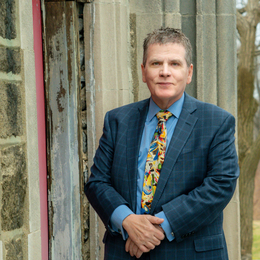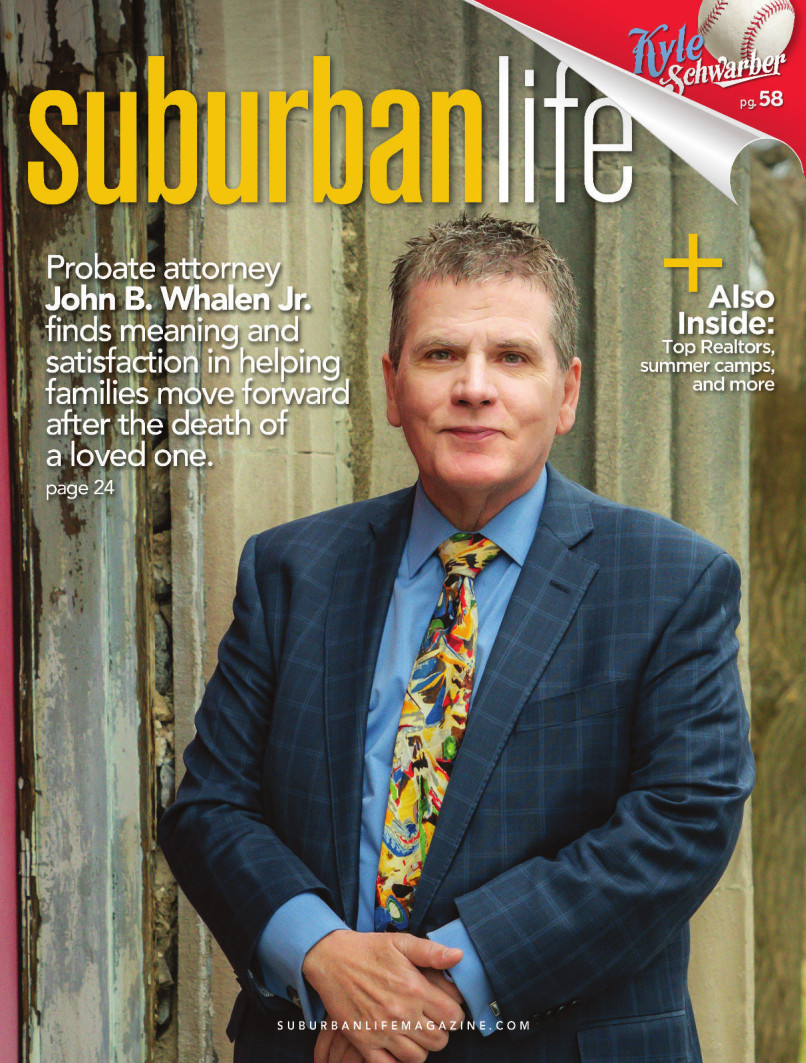
Death Is Not the End
Probate attorney John B. Whalen Jr. finds meaning and satisfaction in helping families move forward after the death of a loved one.
Death is a fact of life, though many of us prefer not to talk about it or even think about it. While pretending as though we will live forever may provide some small degree of comfort, John B. Whalen Jr. says avoiding reality is likely to our detriment.
Whalen is in a good position to judge. As a premier probate attorney based in Wayne, with decades of experience to his credit, Whalen has witnessed firsthand the unfortunate aftermath when a loved one dies without having taken the proper precautions.
“Everybody passes away, whether we like it or not,” he says. “You need to write a will, name an executor, allocate property, and designate a power of attorney. It’s very easy to do if you do it early. The problem is that most people don’t do it early; they don’t want to deal with it until it’s too late.”
Whalen initially thought he would pursue a career in criminal law. He made a course correction while still in law school, when wills, estates, and probate sparked his interest. Though some might consider the subject matter morose, he deeply enjoys the work.
“I like the opportunity to work with people directly,” he says. “I always tell people to just give me a call; a conversation with me won’t cost you a dime. To be honest, it doesn’t matter to me if you become a client. What matters to me is that you take care of your family.”
During a recent interview with Whalen, he shared his perspective on the rewards of planning ahead, what to expect after the death of a loved one, and how someone like him can help.
Q&A
For those who haven’t really made plans for the estate they will one day leave behind, why should they?
When there’s no advance planning, I’ve seen it tear families apart. When both parents have passed away and the will has not been written and no one has been named as executor, the [adult] children will often fight. Mom and Dad’s assets are usually not in their name anymore, and have been titled with one of the children purely out of convenience. All of a sudden, you have mistrust and hurt feelings, and people stop talking to each other. I always thought that would be the exception, but I’m figuring out it’s the rule.
For those who haven’t really made plans for the estate they will one day leave behind, why should they?
When there’s no advance planning, I’ve seen it tear families apart. When both parents have passed away and the will has not been written and no one has been named as executor, the [adult] children will often fight. Mom and Dad’s assets are usually not in their name anymore, and have been titled with one of the children purely out of convenience. All of a sudden, you have mistrust and hurt feelings, and people stop talking to each other. I always thought that would be the exception, but I’m figuring out it’s the rule.
Even when things are spelled out clearly, there is the potential for problems. I’m the oldest of six, and when my parents died, my siblings and I went through a difficult time. Everything is fine now, but it was iffy for a while because it’s such an emotional thing to deal with.
The groundwork for probate needs to be done well in advance, so when is a good time to enlist an attorney to draft the essential estate-planning documents?
It’s best when everybody is alert, healthy, and knows what they want to do. You can always come back to the will and make adjustments, if needed, and you probably should whenever there are big changes in your life, like a divorce or the death of a spouse. You can rewrite the will every day if you really want to.
It’s best when everybody is alert, healthy, and knows what they want to do. You can always come back to the will and make adjustments, if needed, and you probably should whenever there are big changes in your life, like a divorce or the death of a spouse. You can rewrite the will every day if you really want to.
Tell me about the process of starting the planning process.
I just sit down with a blank piece of paper and start talking to them; it’s organic. They usually wind up answering my questions before I even ask them—the who, what, and where of their situation. You learn that every family is the same, more or less. We all think we have problems that no one else has—things like addiction and mental illness—but that’s far from the truth. At the end of the day, we’re talking about piece of mind. Fathers tend to want quiet, and mothers tend to want everybody to be happy. When you do things right, you try to accomplish both.
I just sit down with a blank piece of paper and start talking to them; it’s organic. They usually wind up answering my questions before I even ask them—the who, what, and where of their situation. You learn that every family is the same, more or less. We all think we have problems that no one else has—things like addiction and mental illness—but that’s far from the truth. At the end of the day, we’re talking about piece of mind. Fathers tend to want quiet, and mothers tend to want everybody to be happy. When you do things right, you try to accomplish both.
In matters of probate, is there anything people can do to prepare other than to contact someone like you?
At that point, you need the death certificate and the will, and that’s where you start. In Pennsylvania, it takes an average of two years to settle a will. Probate means “to prove,” from the Latin word probare. Creditors, taxes, and everything else needs to be taken care of before the remaining estate is distributed. We’re dealing with death, but it impacts an awful lot in the world of the living. If an adult child is living in his mother’s house and she passes away, will that child get to stay in the house? Some people think that just because they’re the son or daughter [of the deceased] that the money or assets will come directly to them, but that’s not true. They don’t have the right to inherit. A lot of people have misconceptions about the process.
At that point, you need the death certificate and the will, and that’s where you start. In Pennsylvania, it takes an average of two years to settle a will. Probate means “to prove,” from the Latin word probare. Creditors, taxes, and everything else needs to be taken care of before the remaining estate is distributed. We’re dealing with death, but it impacts an awful lot in the world of the living. If an adult child is living in his mother’s house and she passes away, will that child get to stay in the house? Some people think that just because they’re the son or daughter [of the deceased] that the money or assets will come directly to them, but that’s not true. They don’t have the right to inherit. A lot of people have misconceptions about the process.
Losing your parents is very difficult, and you can’t really prepare for it; you have to go through it. When my dad passed away, my world ended. I don’t even kid around with people when they tell me they have differences with their parents. They say, “I want them to see things from my perspective.” My response is very direct. I tell them, “At some point, they’re not going to be here, so hug them and forgive them.” A lot of people have regrets when a parent dies, and many of the problems I see are spurred by that; it’s all emotion.
What do you find most interesting about your line of work?
It’s real. I know the problems people face, and I’m here to help them try to avoid those problems. At this point, I’m working with three generations of some families, so I’ve learned a lot about people from doing this work for so long. Many women have a nurturer’s mentality, so they’re much better about doing the necessary planning to take care of the family. Men, on the whole, don’t want to think about death; their goal is to live forever. No matter who I’m working with, I try to assure them that everything is going to be fine.
It’s real. I know the problems people face, and I’m here to help them try to avoid those problems. At this point, I’m working with three generations of some families, so I’ve learned a lot about people from doing this work for so long. Many women have a nurturer’s mentality, so they’re much better about doing the necessary planning to take care of the family. Men, on the whole, don’t want to think about death; their goal is to live forever. No matter who I’m working with, I try to assure them that everything is going to be fine.
Do you have any advice for people who may not have started the planning process?
Just do it. If you take care of it and write it down and deal with an attorney to have it done properly, you can avoid an awful lot of things. Picking a good executor is always an art form. You want someone who’s able to rise above the fray, and deal with the ins and outs of the fighting that may follow. I’m happy to offer my opinion when someone asks for it, but I never want to step on someone’s toes.
Just do it. If you take care of it and write it down and deal with an attorney to have it done properly, you can avoid an awful lot of things. Picking a good executor is always an art form. You want someone who’s able to rise above the fray, and deal with the ins and outs of the fighting that may follow. I’m happy to offer my opinion when someone asks for it, but I never want to step on someone’s toes.
Is there anything people should know about you?
I’m quiet and introverted, mostly, and I enjoy what I do. I love good movies, good music, and a good cigar. People should also know that, while I do have a home office, most people don’t want to visit an attorney in their downtime, so I’m happy to travel to their home or office. Lastly, I think it’s important to feel like you can ask questions of your attorney. Not all lawyers feel that way. It amazes me that some lawyers talk down to people. I don’t know where the pomposity and condescension come from; it certainly was not taught to me in law school.
I’m quiet and introverted, mostly, and I enjoy what I do. I love good movies, good music, and a good cigar. People should also know that, while I do have a home office, most people don’t want to visit an attorney in their downtime, so I’m happy to travel to their home or office. Lastly, I think it’s important to feel like you can ask questions of your attorney. Not all lawyers feel that way. It amazes me that some lawyers talk down to people. I don’t know where the pomposity and condescension come from; it certainly was not taught to me in law school.
John B. Whalen Jr., Esq.
(610) 999-2157 | jw60297@me.com
whalenpaprobatelawyers.com
(610) 999-2157 | jw60297@me.com
whalenpaprobatelawyers.com
Photo by Jody Robinson
Published (and copyrighted) in Suburban Life magazine, July 2023.



